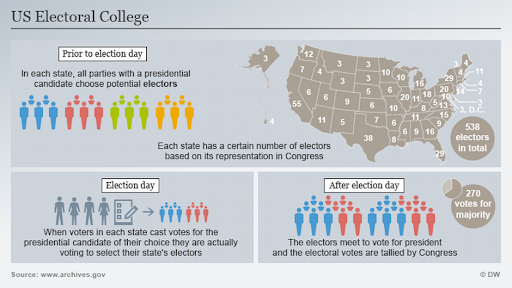What Would Happen if the Presidential Elect Were to Die?
With two old candidates, speculations as to what their deaths would bring have increased.

Image of Election Process courtesy of Archives.gov
October 30, 2020
The health of the current presidential elects has recently been questioned, with Trump having contracted COVID-19 and Biden, 77, being generally old. With these recent occurrences the question has been brought to mind: “What would happen if the presidential elect dies before we know who officially won?” There are multiple scenarios where this would take place, as well as a lot of controversy, as post-voting pre-election death is not addressed in the constitution. However, there is still some information combined with speculation as to what would happen.
Scenario 1: The president dies before assuming office but after the Electoral College votes.
The most direct information we get about the subject is located in the 20th amendment. It states “If the President shall not have been chosen before the time fixed for the beginning of his term then the Vice President elect should act as President”. This tells us what would happen if the president were to die before being officially sworn into office, but after they are confirmed as the winner of the election by Congress. Whoever is the candidate’s vice president would take over with no questions asked.
Scenario 2: The presidential elect dies, or resigns before Congress has counted the electors’ votes.
This is one of the most debated scenarios surrounding this issue, and there is no clear answer as to what would happen. According to an interview by The Washington Post with law professor Richard Pildes, Congress would first have to decide whether or not to count the votes of someone who is dead. If they chose not to, then the House of Representatives would decide who would become president, with each delegation getting one vote. The person they choose would likely be the candidate’s vice president, but wouldn’t have to.
Scenario 3: The presidential elect dies before the electors have voted.
In this case, The Washington Post says that the Republican National Committee (RNC) or the Democratic National Committee (DNC) would put forth a candidate to replace the dead candidate. However, only in a couple of states are electors not legally bound to vote for who their state has chosen to become president. This means that those who can would likely vote for the RNC’s nominee, but if they can’t it becomes much more complicated. That is why in this case many speculate that these laws would be broken without repercussions and electors would vote for the candidate proposed by their respective committees, but this could potentially be brought up in a court of law, which is what makes this scenario extremely complicated.
Scenario 4: The elect dies before Election Day on Nov. 3.
This is interesting, because at this time most of the ballots have likely been printed, and to reprint them in time would be nearly impossible. Postponing the election, though theoretically possible, would be incredibly difficult and time consuming. We are left with one option, in which, simply put, officials formally replace whoever dies with someone else without reprinting the ballots. Say if Joe Biden were to die, the DNC would then vote on someone to replace him. Let’s say this person was Jill Biden. Everyone would then know that voting for Joe Biden is actually voting for Jill Biden. According to Vox, there has been a situation where this exact thing happened and the widow of a Missouri governor candidate ended up becoming the governor despite not running.
Although there are a lot of uncertainties, because of the unique time we live in, it is important that we have some idea of what would happen if the unfortunate event took place, in order to keep 2020 from becoming even more chaotic (Related: the election process if even more complicated if you live in the state of Iowa).








